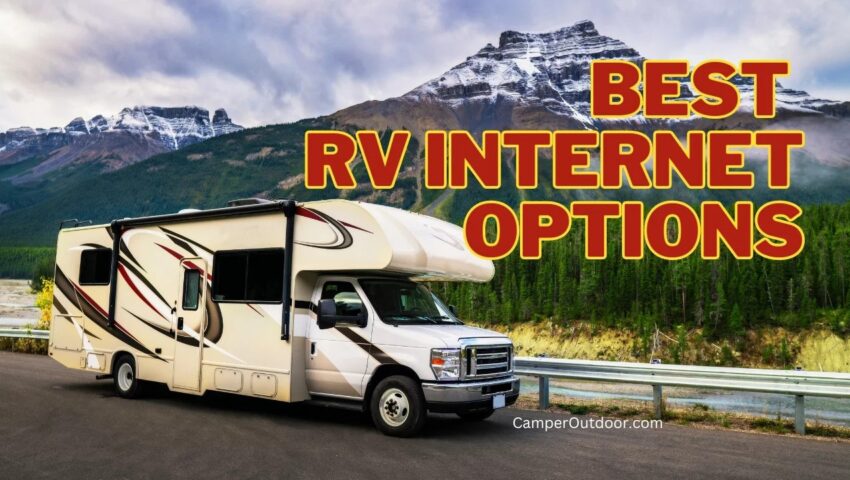
Travelling in an RV or camper is a great option to visit new places, enjoy nature and experience freedom of the open road. However, having a good internet connection is also important even you are on an adventure. This is because using an internet in RV is not a luxury but necessity of this digital age.
Travelling in an RV or camper is a great option to visit new places, enjoy nature and experience freedom of the open road. However, having a good internet connection is also important even you are on an adventure. This is because using an internet in RV is not a luxury but necessity of this digital age.
Having a reliable internet connection on the go is helpful to stay in touch with family, check the weather forecast, and follow online maps to stay on track. Besides this, internet also provides different entertainment options and often lifesaving strategies too. In other words, internet keeps travelers productive on the road.
However, what if you don’t know the best internet options for your RV or camper? Well, this blog post explains all the possible options you can consider in different situations easily. So, let’s find out.
Different Types of Internet Connections for Your RV or Camper
There are a lot more internet options for RV travelers. Each option has some benefits and drawbacks which depend on your location and usage on the go. Here is a breakdown of all the possible internet options for RVs:
WiFi
Undoubtedly, WiFi is a popular option for getting a good internet connection in your RV. Many campgrounds, RV parks, coffee shops, and other public places provide WiFi networks that are easy to connect. It works great when you are staying at a place that provides safe connection.
However, it’s not a reliable option for using an internet while traveling because it has limited connectivity over remote areas or less-developed spots. Even with well-equipped campgrounds, you can use internet for light uses like email checking or web browsing.
Cellular Data
Another common type of internet connection is the cellular data that travelers use mostly. You can either use your mobile as a hotspot or a specific hotspot device to use a good internet connection on the road.
Unlike WiFi, cellular data works great while traveling and staying at places with no public WiFi. For this, you should have a reliable cellular plan with sufficient data so that you can use it to scroll social media or work remotely.
It’s a flexible and portable internet option for RV travelers who don’t want to rely on finding WiFi hotspots. However, it also depends on cell phone coverage and thus works well in such areas only.
Satellite Internet
Satellite Internet is also there for you if you are traveling to areas where WiFi or cellular networks are not available. It uses a dish that connects with a satellite in orbit which is why it can provide internet anywhere as long as the sky is clear.
So, if you are planning to visit rural areas, choosing satellite internet is a great way to enjoy a good connection. Similarly, it’s also better for tourists who stay in national parks, camp in deserts or visit isolated mountain regions. In fact, it’s a reliable option if you are planning to stay for longer at remote locations.
DSL/Cable Internet
Some RV parks where travelers stay for a long time also provide DSL or cable internet options. It works the same as your internet service at home. However, it’s not a common option at every RV park.
It’s great for those travelers who stay in one spot for a long time like snowbirds who work from their RV full-time. It provides a strong and steady internet connection perfect for streaming and even online gaming. But for this, you should plan to stay at a place which provides this option.
How to Choose the Right Internet Option for Your RV or Camper?
As you find that a lot of internet options are available out there to consider for your RV trip, but choosing any one of these is challenging. However, it becomes easier when you know about your needs and what each option offers.
To decide better, consider the following factors:
Coverage – Consider your traveling plans first that where are you going and how long you’ll stay at any place. Because for shorter coverage or within popular cities, WiFi is a great option. For remote or rural areas, you should consider cellular data or satellite internet to stay connected on the go.
Internet Speed – Find out your online activities and plan about what to do online while traveling. This is because if you want internet connection for web browsing or email checking, you can easily do this using WiFi. Otherwise, a good internet speed is required for video calls or streaming that you can get through cellular data.
Data Limits – Every internet option has somewhere connectivity limitations. For example, WiFi often has unlimited connectivity but it’s slow and unreliable. On the other hand, cellular data plans have limited data that you can use within a specific timeframe or price. So, if you have longer plans and unexpected situations, you should consider more than one internet option for your RV or camper.
Portability – In terms of portability, cellular data is a great option. No matter if you are using your mobile or a hotspot device, you can carry it anywhere and enjoy a good internet connection. While other options like satellite internet require a setup to provide signals.
Reliability – Internet connection should be reliable during traveling from place to place. In this regard, cellular data and satellite internet are the best options for your RV whereas WiFi is not reliable and available all the time.
So, it’s about understanding your needs and requirements for an internet connection that makes the selection easier and straightforward.

